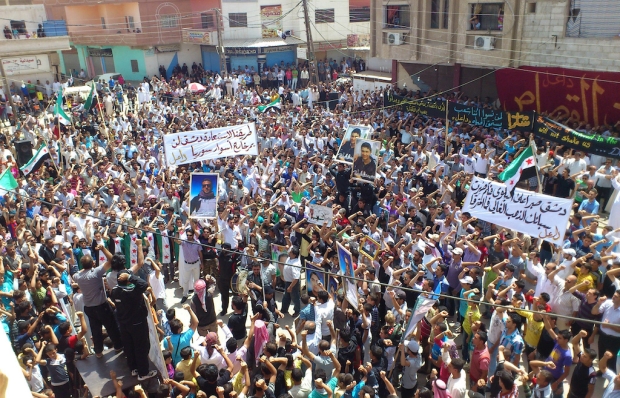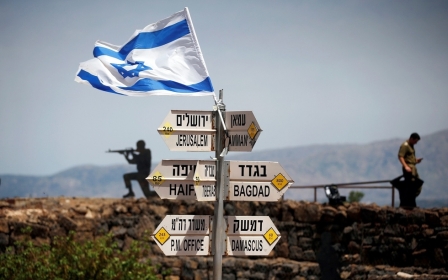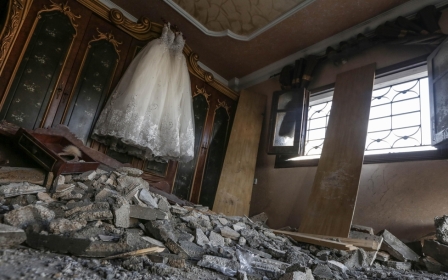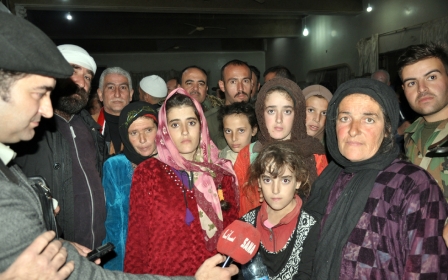Syrian rebels and activists face arrest, disappearance despite 'reconciliation'
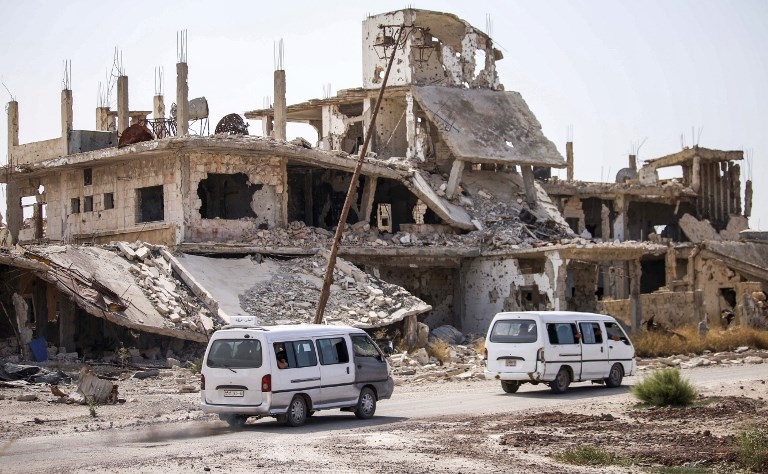
AMMAN, Jordan - Early morning, 7 November. A dead body lies on the side of a back road somewhere on the outskirts of the southern Syrian town of Dael.
A small crowd has gathered around the corpse, while plainclothes security officers - members of Syria's notorious Air Force Intelligence security branch, according to eyewitnesses - stand in the way to stop anyone from getting a closer look.
Even so, many bystanders suspect they already know the victim's identity.
Just hours earlier, Ghanim al-Jamous, the former head of Dael's opposition-affiliated Free Syrian Police force, disappeared from his home. His family had grown worried, taking to the streets to search for their relative.
A former Syrian army officer who defected to the opposition shortly after fighting began, al-Jamous ended his work with the Free Syrian Police several months ago and had begun the process of reconciling his status with Damascus, an opaque procedure by which Syrians in formerly rebel-held areas are purportedly given the opportunity to transition back to life under state control without penalty.
Past anti-government activities would be forgiven, even among fighters and activists, as government negotiators implored undecided Daraa residents to return to the "nation's embrace".
Reconciliation began for residents of Syria's south in July, when pro-government forces backed by Russian air power took control of the entirety of Daraa province, as well as neighbouring Quneitra, from rebel forces. Thousands of residents, including fighters and civilians who rejected the government's terms, boarded evacuation buses and departed for Syria's rebel-held north.
Others, like al-Jamous, took their chances and stayed behind.
Widespread arrests and disappearances are violating the very fundamentals of a process supposedly designed to reintegrate swaths of formerly opposition-held areas of the country back into the government's fold
Back at the roadside that November morning, several of al-Jamous' relatives have finally convinced the security officers to let them help identify the body.
Peeling away the tarp covering the body, relatives find the former police chief's body bearing apparent signs of torture, including cut marks strewn across his body, as well as several bullet holes to the chest, according to a source close to the relatives in Dael who identified the body. One of al-Jamous' fingers had been cut off.
Al-Jamous' disappearance and apparent killing follows a wave of arrests targeting civilians, ex-rebels and former opposition members across the province since reconciliation, leaving relatives quick to blame the Syrian government.
"A lot of the family is saying that the Air Force Intelligence [security branch] is behind this," a relative of al-Jamous tells Syria Direct.
Several of the deceased's relatives agreed to speak to Syria Direct about the former police officer's disappearance and killing, but only on strict condition of anonymity for fear of reprisals.
"He didn't have issues with anyone," the al-Jamous relative tells Syria Direct. "He was a quiet, peaceful man."
Al-Jamous' disappearance is not a one-off case. According to a tally by Syria Direct based on documentation and interviews with a dozen local activists, former opposition officials and relatives of the disappeared, pro-government forces have detained at least 23 former rebel commanders and opposition figures across Daraa province since retaking control of the southwest in July.
Dozens more arrests have also targeted civilians, mostly young men, according to records provided to Syria Direct by the Daraa Martyrs' Documentation Office.
Reliable information about the circumstances of these disappearances and arrests is hard to come by. Though the number of arrests is likely higher, Syria Direct could not independently confirm all reported cases.
Local sources, including a negotiator who helped assemble the final agreement deciding the south's fate, describe a province in flux as a nebulous political transition unfolds, sometimes violently.
Meanwhile, widespread arrests and disappearances are violating the very fundamentals of a process supposedly designed to reintegrate swathes of formerly opposition-held areas of the country back into the government's fold.
'We don't even know if he's alive'
In June, the Syrian government launched a massive aerial and ground campaign on rebel positions across the country's southern Daraa and Quneitra provinces, sparking one of the largest population displacements in the war as nearly a quarter million civilians were driven from their homes.
Many observers expected a long and bloody battle. But in July, just weeks after the campaign had begun, the fighting was already over. Pro-government forces captured critical strategic zones - including mountains and hilltop towns overlooking rebel positions - and negotiated for the surrender of opposition forces on a town by town, city by city basis.
Thousands of Daraa and Quneitra residents, activists and rebel fighters would board government buses bound for Syria's rebel-held northwest as part of the handover agreement. Those who wished to remain in their hometowns were required to sign on to an ambiguous reconciliation process in order to return to life under government control.
Under the government-administered reconciliation process, in some areas brokered with Russian support, military-aged males were given a six-month grace period - starting in August - to visit a government reconciliation centre and regularise their status with the authorities. Those who hadn't completed their military service would have to do so when the six-month grace period ended.
Reconciliation remains an ongoing process, with residents in Daraa and Quneitra left with two months in which to regularise their status.
But sources on the ground tell Syria Direct that reconciliation already appears to be breaking down - with accounts of widespread arrests and forced disappearances, harassment at checkpoints as well as the dissolution of a Russian-backed pro-government militia originally set up to absorb reconciled rebel fighters.
The first signs of that breakdown came in a-Lajat, a largely rural region in the eastern Daraa countryside where the Syrian government launched a major arrest campaign in early September.
Dozens of civilians were rounded up for purported links to the Islamic State (IS), according to pro-government media reports. Although IS previously controlled large sections of the Yarmouk Basin in southwestern Daraa province, the majority of those arrested had no discernible links to the hardline Islamist group, activists told Syria Direct at the time.
After a-Lajat, the security crackdown widened. On 3 September, pro-government forces detained former Free Syrian Army (FSA) commander Ayham al-Juhmani in his home city of Nawa in western Daraa province.
Al-Juhmani led the Nawa-based FSA brigade Ahrar a-Nawa when the city surrendered to the government in July, before beginning the reconciliation process with the government, according to pro-opposition media outlets.
The circumstances of his disappearance are not immediately clear.
According to two of al-Juhmani's relatives who spoke to Syria Direct, local eyewitnesses saw a vehicle with blacked-out windows pull up alongside the former FSA commander outside a local shop before he was snatched off the street. Syria Direct could not independently confirm the account.
"Nobody knows who arrested him," Abu Muhammad, one of al-Juhmani's relatives who now lives in Idlib after evacuating from Nawa in July, tells Syria Direct.
Family members say they have been unable to reach anyone with details of his arrest, nor have they been able to determine his whereabouts through official channels.
"We don't even know if he's alive," Abu Muhammad says.
'Judge and executioner'
Another al-Juhmani relative speculates that the former FSA commander's disappearance could be linked to his brief stay several months ago in the Israeli-occupied Golan Heights, where he received medical care from Israeli doctors.
Israel had previously treated injured Syrian civilians as well as rebel fighters in hospital facilities within the occupied Golan Heights, with the aim of creating ties across the border and keeping nominally Israeli territory secure from unstable, unreliable rebel formations, Syria researcher Elizabeth Tsurkov reported in September.
At the same time, Israeli material support to Syrian rebel fighters has almost certainly put commanders and fighters from those factions well within the crosshairs of the Syrian government and its allies.
Still, it's speculation. Left with no indication whatsoever about what happened, let alone information from government officials, "no one knows for sure" what happened to al-Juhmani, the relative admits.
Although some rebel commanders have been released by the government in recent weeks, most of those arrested or disappeared still remain in detention. In many cases, their whereabouts are simply unknown.
And the arrests are ongoing in some sections of Daraa, sources on the ground say.
The regime doesn't need to gather evidence, it doesn't need to present a case to the court. The regime is in total control
- Fadel Abdelghani, Syrian Network for Human Rights
"Every night the regime raids houses, looking for the wanted," says Abu Mahmoud, a 25-year-old resident of the western Daraa town of Inkhil. "This isn't supposed to happen - the six months haven't finished."
Until now, the majority of arrests and disappearances have centered on the western countryside of Daraa, specifically in areas that were quick to enter negotiations with the government and accept a political settlement, a former rebel commander currently residing in Quneitra province tells Syria Direct.
Those communities that prolonged negotiations and surrendered later in the summer had time to build deeper relationships with government and Russian officers, says the commander, who spoke on condition of anonymity.
"They were also able to hide weapons and prepare themselves - the regime knows that and plans accordingly," he tells Syria Direct. "As for other areas like Dael [in western Daraa province], they gave themselves up - there's no one running things and the regime can arrest new people every day."
Although the majority of the arrested FSA commanders had officially regularised their status with Damascus, the government can still pursue criminal cases or individual lawsuits against reconciled Syrians.
"Reconciliation does not include individual crimes," the commander in Quneitra tells Syria Direct. "Many of those who were arrested are accused of selling drugs, stealing, kidnapping [and so on]."
Although the commander admits that some criminal cases against former FSA leaders are likely legitimate, he and others are concerned that the charges are being used - in many cases - as a pretext to detain those otherwise nominally protected by reconciliation.
"The regime is exploiting [criminal charges]," he says. "Reconciling isn't going to do anything for you if you're facing a lawsuit."
The Syrian government is in "total control" over legal processes in the country, says Fadel Abdelghani, the director of the Syrian Network for Human Rights, a London-based human rights watchdog group.
"The regime doesn't need to gather evidence, it doesn't need to present a case to the court," Abdelghani tells Syria Direct. "The regime is in total control.
"There is no separation between judge and executioner in Syria."
Another consideration is that the transfer of cases - from a criminal court to an anti-terrorism court or to a security branch, for example - means that a given suspect could be tried and sentenced without transparency or accountability.
"In the end, the problem lies with the security branches and the courts in the first place," says Bassam al-Ahmad, director of the Syrians for Truth and Justice human rights monitor.
The detained - fighter or otherwise - could face an "unfair trial" somewhere in the depths of Syria's complex legal system and security infrastructure, al-Ahmad adds.
"This is not in defence of those who have committed crimes. But fighters and civilians alike must be given a fair trial."
'Reconciliation won't help you'
The most public case of criminal charges superseding reconciliation came late last month, when Syrian state television aired an interview with a former FSA commander - clearly under duress - as he gives a confession.
Ahmad al-Faroukh's voice cracks during the video, which aired on Syrian TV late last month. The former FSA commander was arrested by the Syrian government several days earlier from the western Daraa town of al-Hara, and has remained in the state's custody ever since.
According to a broadcast by pro-government news outlet Sama, Syrian security forces arrested al-Faroukh for his role in an alleged kidnapping, for launching "terrorist attacks" on Syrian army positions and working with Israel. One of al-Faroukh's alleged victims pressed charges against the former FSA commander, the presenter explains, leading to his detention.
"If you're involved in private prosecutions, reconciliation won't help you," al-Faroukh tells a Sama journalist on camera. He appears visibly uncomfortable - his beard untrimmed and hair unkempt as he confesses to his purported crimes.
At one point, the camera pans to show al-Faroukh's hands, cuffed around the wrist. They are shaking.
Additional reporting by Mohammed Al-Haj Ali for Syria Direct.
Read the original article on Syria Direct. Follow Syria Direct on Twitter.
Middle East Eye propose une couverture et une analyse indépendantes et incomparables du Moyen-Orient, de l’Afrique du Nord et d’autres régions du monde. Pour en savoir plus sur la reprise de ce contenu et les frais qui s’appliquent, veuillez remplir ce formulaire [en anglais]. Pour en savoir plus sur MEE, cliquez ici [en anglais].


